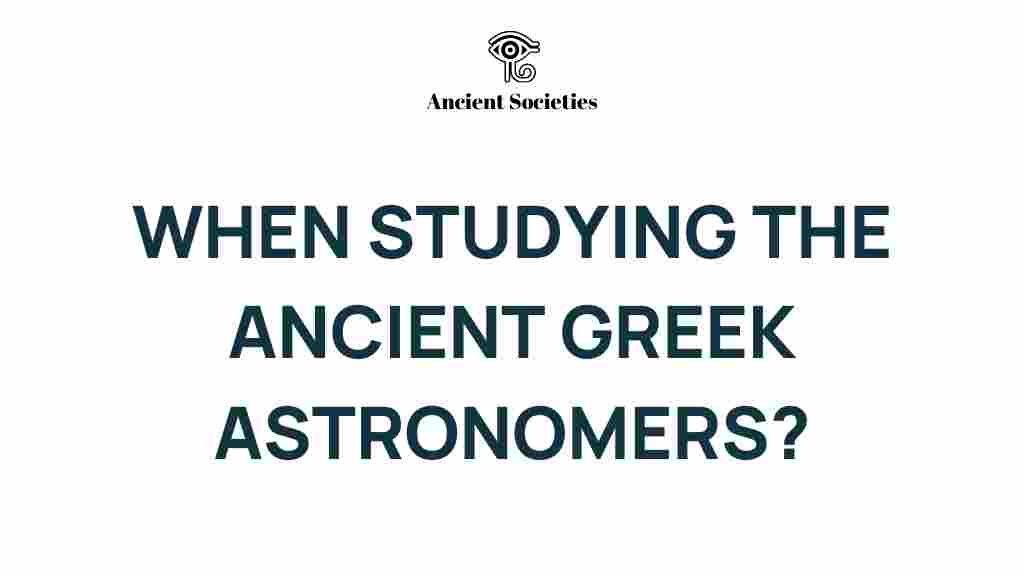Unlocking the Secrets of Ancient Greek Astronomers
The legacy of ancient Greek astronomers is a fascinating chapter in the history of science and philosophy. Their contributions to astronomy and celestial navigation have shaped our understanding of the cosmos and laid the groundwork for modern astronomy. This article will take you on a celestial odyssey, exploring the remarkable achievements of these ancient scholars, the constellations they mapped, and their profound impact on science and philosophy.
The Foundations of Ancient Greek Astronomy
Ancient Greek astronomers emerged during a time of profound philosophical inquiry and scientific exploration. They sought to understand the universe through observation, reasoning, and mathematics. Key figures such as Ptolemy, Hipparchus, and Aristarchus made significant strides in celestial navigation and astronomy, bridging the gap between observation and theoretical frameworks.
- Ptolemy: Known for his geocentric model of the universe, which dominated astronomy for over a thousand years.
- Hipparchus: Credited with creating the first comprehensive star catalog and introducing the concept of stellar parallax.
- Aristarchus: Proposed an early heliocentric model, suggesting that the Earth revolves around the Sun.
The Role of Philosophy in Astronomy
Philosophy played a crucial role in shaping the theories of ancient Greek astronomers. Thinkers like Plato and Aristotle influenced how celestial phenomena were interpreted. The pursuit of knowledge about the cosmos was not merely scientific but also philosophical, leading to questions about the nature of reality, the divine, and humanity’s place in the universe.
Ancient Greek astronomers often sought to reconcile their observations with philosophical doctrines, leading to a rich interplay between these disciplines. The following key philosophical concepts influenced their astronomical theories:
- Cosmology: The study of the universe’s origins, structure, and eventual fate.
- Teleology: The idea that the universe has a purpose or design, influencing how celestial events were understood.
- Mathematics: Seen as the language of the universe, guiding astronomers in their calculations and predictions.
Celestial navigation was essential for ancient Greek sailors and explorers. By studying the stars, they could determine their position and direction, making it possible to navigate vast seas. Ancient Greek astronomers developed techniques to track celestial bodies, which were crucial for maritime travel.
To navigate using the stars, ancient Greek scientists relied on a variety of techniques:
- Star Charts: Detailed maps of the night sky, indicating the positions of constellations and significant stars.
- Astrolabes: Instruments used to measure the altitude of celestial bodies, aiding in determining latitude.
- Horizon Observations: Observing the position of stars on the horizon at specific times to ascertain direction.
The Constellations: A Celestial Map
The ancient Greeks identified numerous constellations, many of which are still recognized today. These constellations served not only as navigational aids but also as a means of storytelling, often linked to their mythology.
Prominent Constellations and Their Stories
- Orion: The Hunter, associated with various myths across cultures, prominently featured in Greek mythology.
- Ursa Major: The Great Bear, which includes the famous Big Dipper asterism, guiding navigators to the North Star.
- Scorpius: The Scorpion, often depicted in myths as a fierce creature that chased Orion across the sky.
These constellations not only provided a celestial map for navigation but also enriched the cultural and philosophical landscape of ancient Greece.
Ptolemy: A Legacy in Astronomy
Ptolemy’s contributions to astronomy are monumental, particularly his work in refining the geocentric model. His seminal text, the Almagest, compiled the knowledge of his predecessors and introduced a comprehensive system for understanding the movements of celestial bodies.
Ptolemy’s Geocentric Model
His model posited that the Earth was the center of the universe, with the Sun, Moon, and planets revolving around it. Although this model was later proven incorrect, it dominated astronomical thought for centuries and influenced Islamic and European astronomy.
The Epicycles
Ptolemy introduced the concept of epicycles, where planets move in small circles while orbiting a larger circle around the Earth. This complex system allowed Ptolemy to explain the apparent retrograde motion of planets, a crucial aspect of celestial navigation.
Challenges and Troubleshooting in Ancient Astronomy
While ancient Greek astronomers made significant strides, they faced many challenges in their quest for understanding the cosmos. Here are some common issues they encountered and how they addressed them:
- Inaccurate Measurements: The lack of precise instruments often led to errors. They improved accuracy by developing better observational tools.
- Misinterpretation of Data: Early astronomers misinterpreted celestial events. They refined their models through rigorous observation and mathematical calculations.
- Philosophical Conflicts: Disagreements among philosophers and scientists sometimes hindered progress. Open debates and discussions helped clarify ideas and fostered advancements.
Despite these challenges, the dedication of ancient Greek astronomers paved the way for future discoveries in astronomy and navigation.
The Impact of Ancient Greek Astronomy on Modern Science
The contributions of ancient Greek astronomers are still felt today. Their methods laid the groundwork for modern astronomy, influencing figures such as Copernicus, Galileo, and Kepler, who built upon their ideas and corrected earlier models.
Key Contributions to Modern Astronomy
- Mathematical Models: The use of mathematics to describe celestial motion remains fundamental in contemporary astronomy.
- Cataloging Stars: The star catalogs created by Hipparchus and others set a precedent for the systematic study of stars.
- Philosophical Inquiry: The relationship between philosophy and science continues to shape our understanding of the universe.
Conclusion: The Enduring Legacy of Ancient Greek Astronomers
Ancient Greek astronomers unlocked secrets of the cosmos through their remarkable blend of science and philosophy. Their contributions to celestial navigation and astronomy have provided a foundation for modern science, inspiring generations of scholars and navigators. By exploring their celestial odyssey, we can appreciate the profound impact these ancient figures have had on our understanding of the universe.
For those interested in delving deeper into the history of astronomy and its philosophical implications, visit this resource for further reading. Additionally, to explore more about constellations and their significance, check out this informative guide.
This article is in the category History and created by AncientSocieties Team
